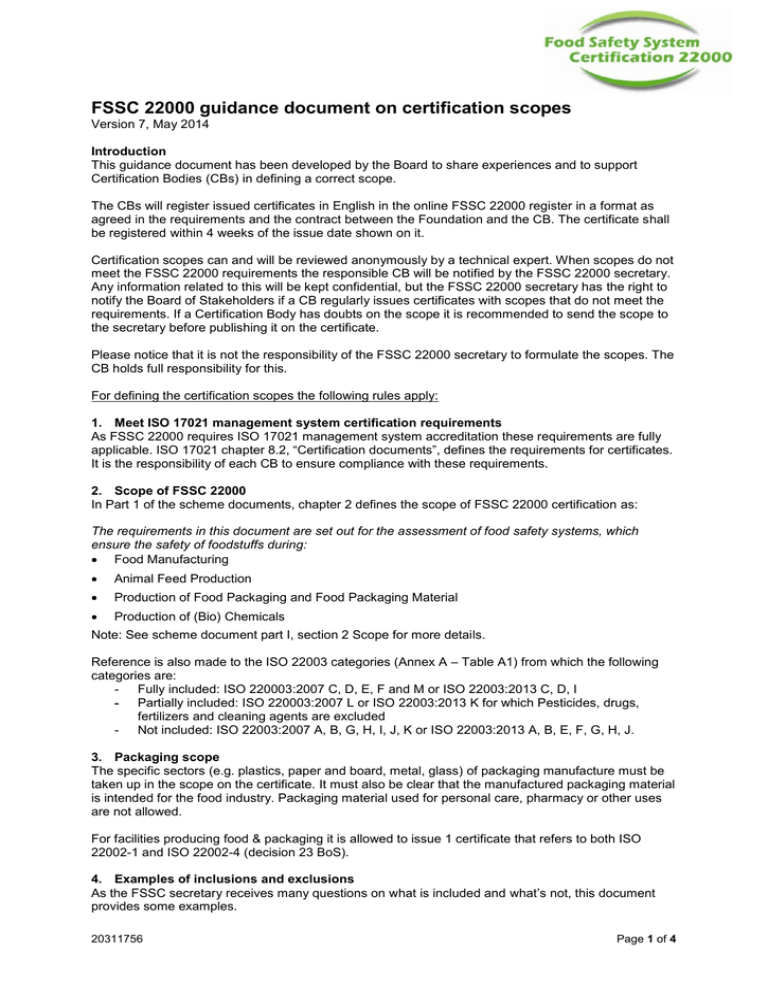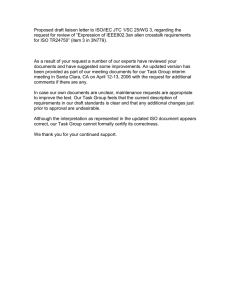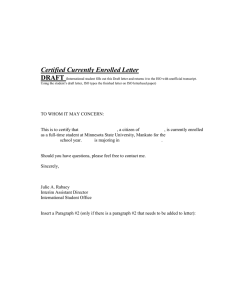FSSC 22000 guidance document on certification scopes
advertisement

FSSC 22000 guidance document on certification scopes Version 7, May 2014 Introduction This guidance document has been developed by the Board to share experiences and to support Certification Bodies (CBs) in defining a correct scope. The CBs will register issued certificates in English in the online FSSC 22000 register in a format as agreed in the requirements and the contract between the Foundation and the CB. The certificate shall be registered within 4 weeks of the issue date shown on it. Certification scopes can and will be reviewed anonymously by a technical expert. When scopes do not meet the FSSC 22000 requirements the responsible CB will be notified by the FSSC 22000 secretary. Any information related to this will be kept confidential, but the FSSC 22000 secretary has the right to notify the Board of Stakeholders if a CB regularly issues certificates with scopes that do not meet the requirements. If a Certification Body has doubts on the scope it is recommended to send the scope to the secretary before publishing it on the certificate. Please notice that it is not the responsibility of the FSSC 22000 secretary to formulate the scopes. The CB holds full responsibility for this. For defining the certification scopes the following rules apply: 1. Meet ISO 17021 management system certification requirements As FSSC 22000 requires ISO 17021 management system accreditation these requirements are fully applicable. ISO 17021 chapter 8.2, “Certification documents”, defines the requirements for certificates. It is the responsibility of each CB to ensure compliance with these requirements. 2. Scope of FSSC 22000 In Part 1 of the scheme documents, chapter 2 defines the scope of FSSC 22000 certification as: The requirements in this document are set out for the assessment of food safety systems, which ensure the safety of foodstuffs during: Food Manufacturing Animal Feed Production Production of Food Packaging and Food Packaging Material Production of (Bio) Chemicals Note: See scheme document part I, section 2 Scope for more details. Reference is also made to the ISO 22003 categories (Annex A – Table A1) from which the following categories are: - Fully included: ISO 220003:2007 C, D, E, F and M or ISO 22003:2013 C, D, I - Partially included: ISO 220003:2007 L or ISO 22003:2013 K for which Pesticides, drugs, fertilizers and cleaning agents are excluded - Not included: ISO 22003:2007 A, B, G, H, I, J, K or ISO 22003:2013 A, B, E, F, G, H, J. 3. Packaging scope The specific sectors (e.g. plastics, paper and board, metal, glass) of packaging manufacture must be taken up in the scope on the certificate. It must also be clear that the manufactured packaging material is intended for the food industry. Packaging material used for personal care, pharmacy or other uses are not allowed. For facilities producing food & packaging it is allowed to issue 1 certificate that refers to both ISO 22002-1 and ISO 22002-4 (decision 23 BoS). 4. Examples of inclusions and exclusions As the FSSC secretary receives many questions on what is included and what’s not, this document provides some examples. 20311756 Page 1 of 4 Some examples of included activities are: Slaughtering and deboning; Processing of pet food; including complementary pet food; Processing of fruits and vegetables; Manufacturing of food ingredient additives like vitamins and emulsifiers; Manufacturing of dietary food supplements sold for direct consumption; Any gas which is included in the Codex list of additives (List of Codex specifications for food additives - current version CAC/Misc 6) would be considered within FSSC 22000 scope for certification. In this case ISO 22002-1 will be used. In the scope on the certificate the statement “…used as food ingredient” [or equivalent wording] must be taken up; Any gas which is included in the Codex list of processing aids as packaging gas (Codex inventory for processing aids - current version CAC/Misc 3) would be considered within FSSC 22000 scheme scope for certification. In this case ISO 22002-1 will be used but the phrase ‘…used as a food ingredient’ or equivalent will be replaced by an appropriate statement of intended use such as ‘…used as packaging gas’; For gas re-packagers, while we cannot prevent the use of FSSC if an organization really wants to do so, we suggest that CBs should recommend that they apply ISO 22000 and develop their own PRPs in accordance with Clause 7.2 in ISO 22000; Packing of “naked” food products (Unpackaged Product); Manufacturing of Packaging products for presentation like ice-cream wood sticks; Filling of pre-manufactured products from bulk into trade or consumer packages; Storage, warehousing & distribution operations [on or off site] may be added to the manufacturing scope in cases where these are • dedicated to the company's own production • included within the audited food safety management system • part of the same legal entity. Some examples of excluded activities are: All activities not part of ISO 22003:2007 C, D, E, M, F and L or ISO 22003:2013 categories C,D, I & K; Processing pharmaceutical ingredients; Modified atmosphere mixtures for including in sealed food packaging or storage vessel environment; Farming; Manufacturing of additives and raw materials for food packaging; Growing of bean sprouts (controlled growing where the sprout itself is the product); Development and design as separate activity. Unless it is an activity in addition to a processing or manufacturing activity and part of the same legal entity. The development process shall be audited against the applicable FSSC 22000 requirements; Storage, warehousing, distribution, delivery, supply, dispatch, and sales (offices) on or off site, which are not part of the same legal entity; Packaging material manufacturing intended to be used in the pharmaceutical, medical or personal care industry. Additional remarks Based on the ISO 17021 and FSSC 22000 scheme requirements the scopes shall: Always describe the audited processes and products / product groups. It is recommended to use terminology like processing, manufacturing, packing; Not be misleading. Any limitations shall be described in the scope; Not be vague. So instead of “manufacturing of beverages” it shall define what kind of beverages; Define the main activities and not obvious supporting activities like receiving raw materials, cooking batches of raw materials, human resources etc. unless this is essential to clarify what is meant by the term production; Not be holding any promotional statements; Only refer to the processes, products, sites, etc. of the organization that were assessed during the audit; Combat potential confusion among customers and end users; 20311756 Page 2 of 4 Brand names are not recommended. If a client wishes to include a brand name, this is not forbidden but will form a restriction to the validity of the products that are named in the scope; Terms like “organic” may not be used in the scope. If the term has a specific set of requirements to be met before it can be used, and those requirements are not fully covered by the scope of the FSMS audit, then it can't be used in the scope. 5. Examples of correct and incorrect scopes The following examples can be used as guidance for correct and not correct / not complete scopes. These examples were discussed during the yearly FSSC 22000 harmonization meetings for Certification Bodies. No. 1 Scope description Supply of cleaning fluids (detergents and disinfectants) in plastic containers for food industry. Manufacturing of biscuits. Cooled transport of processed ready to eat salads. Acceptable No 4 5 Production of chili sauce. The manufacture of high quality cereals from ecological grain growing. Yes No 6 Production and packing of vegetable oil. Yes/No 7 Production (pressing, winterization filtering and filling) of olive oil. Production (storage, filling and packing) of olive oil in glass bottles. Yes 9 The Olive tree® is a producer of high quality pure olive oil. Products are supplied in glass bottles ranging from 100 ml to 2.5 liters. No 10 Production of pasteurized milk and sterilized milk. Trade in processed food stuffs. Yes 12 The production of liquid canned soups. Yes 13 Production and packing in glass of ambient stable pickled vegetables Yes 2 3 8 11 20311756 Yes No Yes No Comments and suggestions for improvement Production of cleaning chemicals is not possible within the present FSSC 22000 scope. ISO 22000 can be applied. Distribution and transport are not part of the present FSSC 22000 scope. ISO 22000 can be applied. Although this is food production and thus within the scope, subjective terms (high quality, good, high standard etc) shall not be used in a scope. For a company that really produces oil (pressing, extraction) this might fit, however for a company that only fills oil into bottles the term production as such may be misleading and incorrect. In this case it is clear what is meant by production. Parts of production processes may be included as scope for FS 22000 as long as these actually include production steps that change the nature of the product and the scope is limited to these steps. The nature of the production is not clear. Apparently this is only filling (see above). The scope shall clearly identify the applicable steps of the production process and not be a commercial formulation. Use of brands in the scope is not recommended. Trade is not included in FS 22000 scope. Even if it had been production of food stuffs this scope would not be accepted since the nature of this products is not clearly identified. The kind of packaging material can add a health risk to the process and/or product. This could mean a “limitation” of the scope by describing the kind of packaging. The kind of packaging material can add a health risk to the process and/or product. This could mean a “limitation” of the scope by describing the kind of packaging. Page 3 of 4 The production of natural ripened half-hard cheese. Slicing and packing of cheese in plastic packaging materials, under protected atmosphere. Production of food gases Nitrogen, Oxygen, Argon, Nitrogen Dioxide, Carbon Dioxide, Hydrogen and gas mixtures Yes The kind of packaging material can add a health risk to the process and/or product. This could mean a “limitation” of the scope by describing the kind of packaging. Yes Gasses used as food ingredients or as packaging Gas must use appropriate qualifying statements in the scope. (See examples in section 4) 16 Filling and distribution of food gasses oxygen, nitrogen, argon, carbon dioxide and mixtures of these Yes 17 Receive bulk gas and repack into smaller vessels for commercial use Yes but not recommend 18 Production of dry ice Yes The FSSC 22000 scheme definitions mention that food manufacturing is also called food processing. Filling can be seen as a process and would therefore fit in the FSSC scope. Therefore filling of gases is in the scope of FSSC 22000. This activity is regarded as equivalent to a repacker who receives bulk food products and converts to smaller commercial packages. For gas re-packagers, while we cannot prevent the use of FSSC if an organization really wants to do so, we suggest that CBs should recommend that they apply ISO 22000 (with regards to the specificity of such process) and develop their own PRPs in accordance with Clause 7.2 in ISO 22000. Dry Ice is solid Carbon Dioxide and can be used to manufacture food products where the carbon dioxide remains in the product. Carbon Dioxide is not a processing aid in this case. Therefore this could also be inside the FSSC scope with the use of ISO 22002-1. To include examples where the processing aid is completely eliminated during the process, so does not appear on the product's list of ingredients - for example, where dry ice is used to create a modified atmosphere or temperature in part of the process, but evaporates completely before the process is complete. Any packaging gas on the Codex list [Codex inventory of processing aids CAC/Misc 3] would be considered within scheme scope for certification with the use of ISO 22002-4 14 15 20311756 Page 4 of 4

